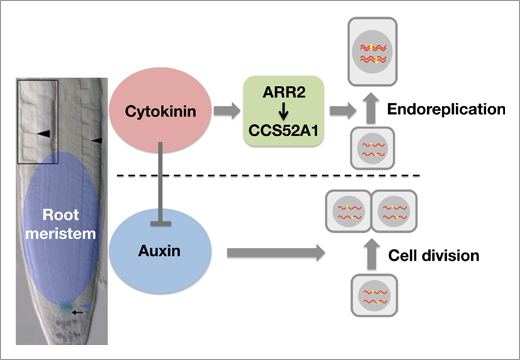Research outcomes
Cytokinins control endocycle onset by promoting the expression of an APC/C activator in Arabidopsis roots
Plant roots respond to various internal and external signals and adjust themselves to changes of environmental conditions. In the root meristem, stem cells produce daughter cells that continue to divide several times. When these latter cells reach the transition zone, they stop dividing and enter the endocycle, a modified cell cycle in which DNA replication is repeated without mitosis or cytokinesis. The resultant DNA polyploidization, named endoreduplication, is usually associated with an increase of nuclear and cell volume, and with cell differentiation. At the transition zone, cytokinin signaling induces SHY2/IAA3, a member of the Aux/IAA family, and inhibits auxin signaling and reduces the expression of auxin efflux carriers, resulting in cell division arrest. However, it remains unknown whether cytokinins additionally control meristem size through an auxin-independent pathway. Professor Masaaki Umeda and Assistant Professor Naoki Takahashi in the Laboratory of Plant Growth Regulation and coworkers found that the cytokinin-activated transcription factor, ARABIDOPSIS RESPONSE REGULATOR 2 (ARR2), directly upregulates the expression of CCS52A1, which encodes an activator of an E3 ubiquitin ligase, anaphase-promoting complex/cyclosome (APC/C), thereby promoting the onset of the endocycle and restricting meristem size in Arabidopsis roots. Genetic data revealed that CCS52A1 function is independent of SHY2-mediated control of auxin signaling, indicating that downregulation of auxin signaling and APC/C-mediated degradation of cell cycle regulators cooperatively promote endocycle onset, and thus fine-tune root growth (Fig. 1).

[ Press Release ] September 13, 2013
( September 26, 2013 )
